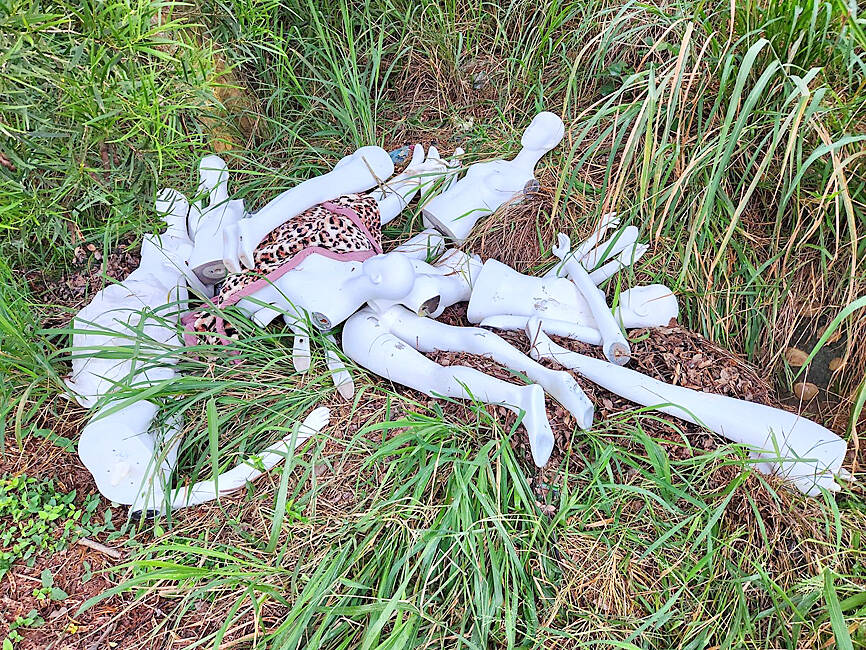Police in central Taiwan have arrested two men on offenses relating to Ghost Month for allegedly scaring people by dressing up at night as a ghastly female demon with its tongue hanging out.
People were frightened and reported it to the police for investigation. The incident took place in Changhua County’s Yuanlin City the previous weekend, which coincided with the Ghost Festival observed on the 15th day of the seventh month of the lunar calendar.
The seventh month of the lunar calendar is traditionally known as Ghost Month in Taiwan, which began on Aug 4.

Photo: screen grab from a video post on the Baoliao Commune, 2nd Site Facebook page
According to Taiwanese tradition, during this time the gates of the underworld are open and spirits are released for a month to be among the living.
After viewing footage filmed by the public and street surveillance cameras, police apprehended two local residents as suspects.
A man surnamed Tsao (曹), 35, allegedly shot the video while his friend surnamed Chang (張), 40, dressed up as a female ghost with long hair in a white dress and a long, red tongue, police said, adding that the duo did their stunt at a street corner in Yuanlin City in the early hours of Aug. 17 for about 10 minutes.

Photo courtesy of Lee Chih-yang
After being questioned, the duo was handed over to prosecutors on suspicion of contravening Article 63 of the Social Order Maintenance Act (社會秩序維護法), which stipulates that people “scaring another person by wearing a disguise or mask, or using other ways to a degree of that may undermine safety” face a maximum fine of NT$30,000 or a three-day prison sentence, Yuanlin Police Station Chief Chiang Yao-pang (江耀邦) said.
The suspects were quoted as saying that they made the video to generate clicks, but people online responded negatively, with comments such as: “This is really stupid, so low,” and: “Only idiots would pull stunts like this to scare people during Ghost Month.”
In Taiwanese traditional beliefs, a prevalent figure in folklore, legends and movies is a female ghost in a white dress with long hair and a long tongue hanging out.
It is a vicious spirit out to take revenge against men who had done her wrong, and all males must avoid her at all costs, lest she kills and eats them, folklore experts said.
MANNEQUINS
In a separate incident in Taichung, residents of Nantun District (南屯) last week were frightened after seeing what they thought were dismembered body parts at the area’s No. 9 cemetery.
“We are now in Ghost Month, and seeing what looked like body parts and a corpse would really be shocking and give people a fright,” local borough warden Lee Chih-yang (李志洋) said.
Lee said residents told him that walking by the area at night was “like a horror movie,” and that “seeing that during this month while riding a scooter at night would surely cause a traffic accident.”
Upon closer examination, Lee said he found the “body parts” were about six mannequins with white plastic mold parts, adding that an investigation is under way to find out who had dumped them.
The incident contravened provisions of the Waste Disposal Act (廢棄物清理法處) and would be subject to a fine of NT$1,200 to NT$6,000, Lee said.
Lee said he has contacted the city’s sanitary and trash collection unit to pick up the discarded mannequins.

ENDEAVOR MANTA: The ship is programmed to automatically return to its designated home port and would self-destruct if seized by another party The Endeavor Manta, Taiwan’s first military-specification uncrewed surface vehicle (USV) tailor-made to operate in the Taiwan Strait in a bid to bolster the nation’s asymmetric combat capabilities made its first appearance at Kaohsiung’s Singda Harbor yesterday. Taking inspiration from Ukraine’s navy, which is using USVs to force Russia’s Black Sea fleet to take shelter within its own ports, CSBC Taiwan (台灣國際造船) established a research and development unit on USVs last year, CSBC chairman Huang Cheng-hung (黃正弘) said. With the exception of the satellite guidance system and the outboard motors — which were purchased from foreign companies that were not affiliated with Chinese-funded

PERMIT REVOKED: The influencer at a news conference said the National Immigration Agency was infringing on human rights and persecuting Chinese spouses Chinese influencer “Yaya in Taiwan” (亞亞在台灣) yesterday evening voluntarily left Taiwan, despite saying yesterday morning that she had “no intention” of leaving after her residence permit was revoked over her comments on Taiwan being “unified” with China by military force. The Ministry of the Interior yesterday had said that it could forcibly deport the influencer at midnight, but was considering taking a more flexible approach and beginning procedures this morning. The influencer, whose given name is Liu Zhenya (劉振亞), departed on a 8:45pm flight from Taipei International Airport (Songshan airport) to Fuzhou, China. Liu held a news conference at the airport at 7pm,

Authorities yesterday elaborated on the rules governing Employment Gold Cards after a US cardholder was barred from entering Taiwan for six years after working without a permit during a 2023 visit. American YouTuber LeLe Farley was barred after already being approved for an Employment Gold Card, he said in a video published on his channel on Saturday. Farley, who has more than 420,000 subscribers on his YouTube channel, was approved for his Gold Card last month, but was told at a check-in counter at the Los Angeles International Airport that he could not enter Taiwan. That was because he previously participated in two

SECURITY RISK: If there is a conflict between China and Taiwan, ‘there would likely be significant consequences to global economic and security interests,’ it said China remains the top military and cyber threat to the US and continues to make progress on capabilities to seize Taiwan, a report by US intelligence agencies said on Tuesday. The report provides an overview of the “collective insights” of top US intelligence agencies about the security threats to the US posed by foreign nations and criminal organizations. In its Annual Threat Assessment, the agencies divided threats facing the US into two broad categories, “nonstate transnational criminals and terrorists” and “major state actors,” with China, Russia, Iran and North Korea named. Of those countries, “China presents the most comprehensive and robust military threat